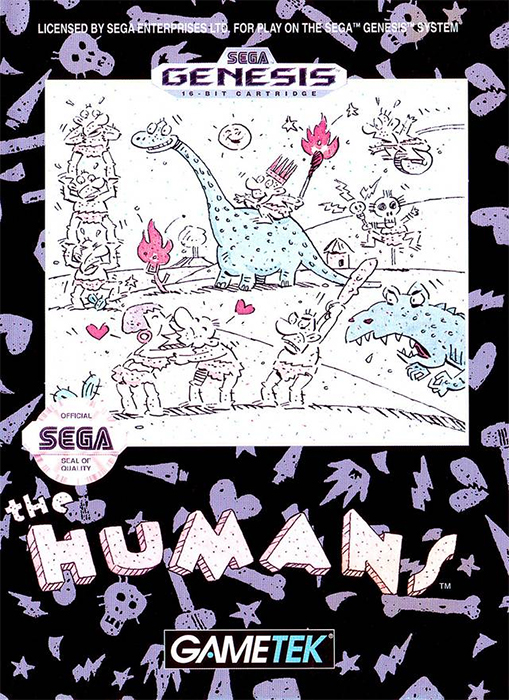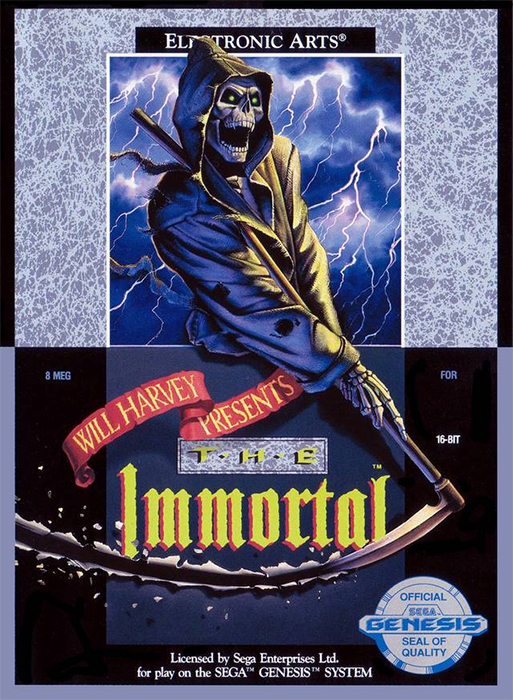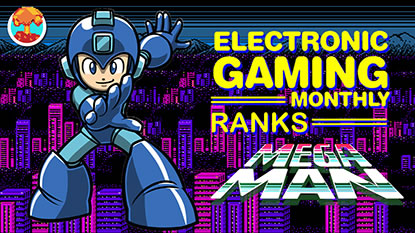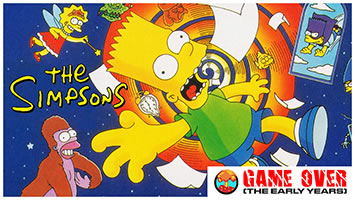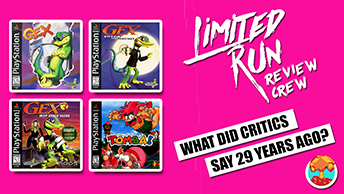- CLASSIC MAGAZINES
- REVIEW CREW
A show recapping what critics thought back
when classic games first came out! - NEXT GENERATION'S BEST & WORST
From the worst 1-star reviews to the best
5-stars can offer, this is Next Generation! - NINTENDO POWER (ARCHIVE)
Experience a variety of shows looking at the
often baffling history of Nintendo Power! - MAGAZINE RETROSPECTIVE
We're looking at the absolutely true history of
some of the most iconic game magazines ever! - SUPER PLAY'S TOP 600
The longest and most ambitious Super NES
countdown on the internet! - THEY SAID WHAT?
Debunking predictions and gossip found
in classic video game magazines! - NEXT GENERATION UNCOVERED
Cyril is back in this spin-off series, featuring the
cover critic review the art of Next Generation! - HARDCORE GAMER MAGAZING (PDF ISSUES)
Download all 36 issues of Hardcore Gamer
Magazine and relive the fun in PDF form!
- REVIEW CREW
- ELECTRONIC GAMING MONTHLY
- ELECTRONIC GAMING MONTHLY RANKS
From Mario to Sonic to Street Fighter, EGM
ranks classic game franchises and consoles! - ELECTRONIC GAMING MONTHLY BEST & WORST
Counting down EGM’s best and worst reviews
going year by year, from 1989 – 2009! - ELECTRONIC GAMING BEST & WORST AWARDS
11-part video series chronicling the ups and
downs of EGM’s Best & Worst Awards!
- ELECTRONIC GAMING MONTHLY RANKS
- GAME HISTORY
- GAME OVER: STORY BREAKDOWNS
Long-running series breaking down game
stories and analyzing their endings! - A BRIEF HISTORY OF GAMING w/ [NAME HERE]
Real history presented in a fun and pithy
format from a variety of game historians! - THE BLACK SHEEP
A series looking back at the black sheep
entries in popular game franchises! - INSTANT EXPERT
Everything you could possibly want to know
about a wide variety of gaming topics! - FREEZE FRAME
When something familiar happens in the games
industry, we're there to take a picture! - I'VE GOT YOUR NUMBER
Learn real video game history through a series
of number-themed episodes, starting at zero! - GREAT MOMENTS IN BAD ACTING
A joyous celebration of some of gaming's
absolute worst voice acting!
- GAME OVER: STORY BREAKDOWNS
- POPULAR SHOWS
- DG NEWS w/ LORNE RISELEY
Newsman Lorne Riseley hosts a regular
series looking at the hottest gaming news! - REVIEW REWIND
Cyril replays a game he reviewed 10+ years
ago to see if he got it right or wrong! - ON-RUNNING FEUDS
Defunct Games' longest-running show, with
editorials, observations and other fun oddities! - DEFUNCT GAMES QUIZ (ARCHIVE)
From online quizzes to game shows, we're
putting your video game knowledge to the test!- QUIZ: ONLINE PASS
Take a weekly quiz to see how well you know
the news and current gaming events! - QUIZ: KNOW THE GAME
One-on-one quiz show where contestants
find out if they actually know classic games! - QUIZ: THE LEADERBOARD
Can you guess the game based on the classic
review? Find out with The Leaderboard!
- QUIZ: ONLINE PASS
- DEFUNCT GAMES VS.
Cyril and the Defunct Games staff isn't afraid
to choose their favorite games and more! - CYRIL READS WORLDS OF POWER
Defunct Games recreates classic game
novelizations through the audio book format!
- DG NEWS w/ LORNE RISELEY
- COMEDY
- GAME EXPECTANCY
How long will your favorite hero live? We crunch
the numbers in this series about dying! - VIDEO GAME ADVICE
Famous game characters answer real personal
advice questions with a humorous slant! - FAKE GAMES: GUERILLA SCRAPBOOK
A long-running series about fake games and
the people who love them (covers included)! - WORST GAME EVER
A contest that attempts to create the worst
video game ever made, complete with covers! - LEVEL 1 STORIES
Literature based on the first stages of some
of your favorite classic video games! - THE COVER CRITIC
One of Defunct Games' earliest shows, Cover
Critic digs up some of the worst box art ever! - COMMERCIAL BREAK
Take a trip through some of the best and
worst video game advertisements of all time! - COMIC BOOK MODS
You've never seen comics like this before.
A curious mix of rewritten video game comics!
- GAME EXPECTANCY
- SERIES ARCHIVE
- NINTENDO SWITCH ONLINE ARCHIVE
A regularly-updated list of every Nintendo
Switch Online release, plus links to review! - PLAYSTATION PLUS CLASSIC ARCHIVE
A comprehensive list of every PlayStation
Plus classic release, including links! - RETRO-BIT PUBLISHING ARCHIVE
A regularly-updated list of every Retro-Bit
game released! - REVIEW MARATHONS w/ ADAM WALLACE
Join critic Adam Wallace as he takes us on a
classic review marathon with different themes!- DEFUNCT GAMES GOLF CLUB
Adam Wallace takes to the links to slice his way
through 72 classic golf game reviews! - 007 IN PIXELS
Adam Wallace takes on the world's greatest spy
as he reviews 15 weeks of James Bond games! - A SALUTE TO VAMPIRES
Adam Wallace is sinking his teeth into a series
covering Castlevania, BloodRayne and more! - CAPCOM'S CURSE
Adam Wallace is celebrating 13 days of Halloween
with a line-up of Capcom's scariest games! - THE FALL OF SUPERMAN
Adam Wallace is a man of steel for playing
some of the absolute worst Superman games! - THE 31 GAMES OF HALLOWEEN
Adam Wallace spends every day of October afraid
as he reviews some of the scariest games ever! - 12 WEEKS OF STAR TREK
Adam Wallace boldly goes where no critic has
gone before in this Star Trek marathon!
- DEFUNCT GAMES GOLF CLUB
- DAYS OF CHRISTMAS (ARCHIVE)
Annual holiday series with themed-episodes
that date all the way back to 2001!- 2015: 30 Ridiculous Retro Rumors
- 2014: 29 Magazines of Christmas
- 2013: 29 Questionable Power-Ups of Christmas
- 2012: 34 Theme Songs of Christmas
- 2011: 32 Game Endings of Christmas
- 2010: 31 Bonus Levels of Christmas
- 2009: 30 Genres of Christmas
- 2008: 29 Controls of Christmas
- 2007: 34 Cliches of Christmas
- 2006: 33 Consoles of Christmas
- 2005: 32 Articles of Christmas
- 2004: 31 Websites of Christmas
- 2003: 29 Issues of Christmas
- 2002: 28 Years of Christmas
- 2001: 33 Days of Christmas
- NINTENDO SWITCH ONLINE ARCHIVE
- REVIEW ARCHIVE
- FULL ARCHIVE
QuByte Classics: 1990s Critics Review The Humans & The Immortal
While everybody celebrates the announcement of the Capcom Fighting Collection and Teenage Mutant Ninja Turtles: The Cowabunga Collection, QuByte has quietly been re-releasing some oft-forgotten classics from the early 1990s. Dubbed QuClassics, we've recently seen modern console ports of both cavemen puzzle game The Humans and The Immortal, one of Electronic Arts' earliest fantasy adventure games. That's really cool, but are either of these games worth playing? To answer this question, I have decided to flip through the pages of Video Games & Computer Entertainment, Sega Pro, Mega Play and more to see what critics said when these games when they first came out. Join me for this debut episode of QuClassics Review Crew.
Before there were Humans, there were Lemmings. Okay, I'm not sure if that's true, but that's definitely the case when it came to video games. Seeing the worldwide success of Lemmings by Psygnosis, Imagitec Designs decided to create a similar puzzle game starring a bunch of cavemen. The result was The Humans, an instantly likable side-scroller that would not only get ported to everything from the Genesis to the Super NES to the Lynx, but also spawn two different sequels. This port of the game features both the 16-bit and portable versions of the game, though sadly ignores the 1995 and 2009 follow-ups.
When it came to the reviews, the critics were sharply divided. The highest score I could find was Dave's take in Mega Play, where he gave it a 92% and called it an "addicting game with plenty of levels to keep players busy." However, in the very same issue, G.O.G. gave the game a 75% and complained that it's "too slow." Like I said, the critics were divided.
When Mega reviewed The Humans in 1993, they focused more on the Lemmings similarities than anything else: "Not quite Lemmings, but pretty close. It's slightly repetitive, but fans of this style of game certainly won't be disappointed." Across the board, the British critics were more likely to give the game high scores than American critics.
You definitely saw this in the Electronic Gaming Monthly reviews, where the scores averaged to a mere 6.75. However, I think it's Video Games & Computer Entertainment who ends up doing the best job describing the problem with The Humans. In the same issue that gave us reviews of Star Fox and Bubsy the Bobcat, they complained that "The main fault with Humans isn't that it fails to live up to Lemmings, rather, Humans fails to live up to itself. Print ads, box art and the instruction manual have created the image of a game with humor. Humans would pull players in by amusing them, or so it seemed. What the image really does is try to compensate for the game's woefully unengaging and slow pace." Thirty years later, and now completely detached from the humorous adverts, perhaps gamers will have a chance to appreciate The Humans for what it has always been -- a rock solid puzzle game.
Long before Electronic Arts published Dragon Age, they gave us The Immortal, a dark and moody isometric adventure game released on the Nintendo Entertainment System, Genesis and a whole bunch of computers. You play an unnamed wizard who enters the Labyrinth of Eternity to rescue the hero's mentor -- Mordamir. The wizard will need to solve puzzles, avoid deathtraps and use a wide assortment of magic spells to kill the monsters of the maze. The game is best-known for its dark fantasy visuals, epic battles and oddly compelling story. And what's really cool is that this brand-new port features both the 8- and 16-bit versions of the game, which are different in some fascinating ways.
While it may not have been the kind of success that spawns multiple sequels, The Immortal was well-received by the critics. In fact, I think it's fair to say that many critics loved the game. I mean, it got a 5 out of 5 from GamePro, saying that "The Immortal conjures up an extraordinary adventure for 16-bit fantasy fans and action buffs. Its only drawback is that once you solve the game -- you've solved it. This is a linear adventure, which makes replaying it much like re-reading a good whodunnit novel after you already know whodunnit. Of course, trying to solve the game can drive you nuts. If you want to add some major magic to your video gaming life, fire up The Immortal."
You also saw similar high marks from the completely unrelated Sega Pro, which ended up giving the game a 94%. "What a corker Immortal is. Blood 'n guts fans will adore it as will hardened arcade adventurers. I love the way you can chop an enemy in half, blow his brains up or make his skin fall away from his body. Excellent!" It's also worth mentioning that fellow British publication Mega Tech gave it an almost identical score of 93%.
Believe it or not, even the lower scores are still pretty great. Mean Machines Sega gave it an 85% and called it a "classic." "The Immortal's greatest strength is the wealth of fiendish puzzles found in every room. There are some sections which might drive you mad, but won't stop you from playing." Video Games & Computer Entertainment also liked The Immortal, but complained that the adventure was too short: "The only major drawback is that the seven levels leave you wanting more. This is no Gauntlet-sized epic, but offers more detail and less length. Adventure game fans have been the most patient -- and most ignored -- of video game players. Finally, they've got something to celebrate: An ingenious game that does justice to the classic sword-and-sorcery genre." Short but great seems to be the consensus. Give it a download and see for yourself.
| Publication | Scores |
|---|---|
| Electronic Gaming Monthly | 6.75/10 |
| Mega | 81% |
| Mega Play | 83% |
| Video Games & Computer Entertainment | 6/10 |
When it came to the reviews, the critics were sharply divided. The highest score I could find was Dave's take in Mega Play, where he gave it a 92% and called it an "addicting game with plenty of levels to keep players busy." However, in the very same issue, G.O.G. gave the game a 75% and complained that it's "too slow." Like I said, the critics were divided.
When Mega reviewed The Humans in 1993, they focused more on the Lemmings similarities than anything else: "Not quite Lemmings, but pretty close. It's slightly repetitive, but fans of this style of game certainly won't be disappointed." Across the board, the British critics were more likely to give the game high scores than American critics.
You definitely saw this in the Electronic Gaming Monthly reviews, where the scores averaged to a mere 6.75. However, I think it's Video Games & Computer Entertainment who ends up doing the best job describing the problem with The Humans. In the same issue that gave us reviews of Star Fox and Bubsy the Bobcat, they complained that "The main fault with Humans isn't that it fails to live up to Lemmings, rather, Humans fails to live up to itself. Print ads, box art and the instruction manual have created the image of a game with humor. Humans would pull players in by amusing them, or so it seemed. What the image really does is try to compensate for the game's woefully unengaging and slow pace." Thirty years later, and now completely detached from the humorous adverts, perhaps gamers will have a chance to appreciate The Humans for what it has always been -- a rock solid puzzle game.
| Publication | Scores |
|---|---|
| Mean Machines Sega | 85% |
| MegaTech | 93% |
| Sega Pro | 94% |
| GamePro | 5/5 |
| Video Games & Computer Entertainment | 8/10 |
While it may not have been the kind of success that spawns multiple sequels, The Immortal was well-received by the critics. In fact, I think it's fair to say that many critics loved the game. I mean, it got a 5 out of 5 from GamePro, saying that "The Immortal conjures up an extraordinary adventure for 16-bit fantasy fans and action buffs. Its only drawback is that once you solve the game -- you've solved it. This is a linear adventure, which makes replaying it much like re-reading a good whodunnit novel after you already know whodunnit. Of course, trying to solve the game can drive you nuts. If you want to add some major magic to your video gaming life, fire up The Immortal."
You also saw similar high marks from the completely unrelated Sega Pro, which ended up giving the game a 94%. "What a corker Immortal is. Blood 'n guts fans will adore it as will hardened arcade adventurers. I love the way you can chop an enemy in half, blow his brains up or make his skin fall away from his body. Excellent!" It's also worth mentioning that fellow British publication Mega Tech gave it an almost identical score of 93%.
Believe it or not, even the lower scores are still pretty great. Mean Machines Sega gave it an 85% and called it a "classic." "The Immortal's greatest strength is the wealth of fiendish puzzles found in every room. There are some sections which might drive you mad, but won't stop you from playing." Video Games & Computer Entertainment also liked The Immortal, but complained that the adventure was too short: "The only major drawback is that the seven levels leave you wanting more. This is no Gauntlet-sized epic, but offers more detail and less length. Adventure game fans have been the most patient -- and most ignored -- of video game players. Finally, they've got something to celebrate: An ingenious game that does justice to the classic sword-and-sorcery genre." Short but great seems to be the consensus. Give it a download and see for yourself.
HOME |
CONTACT |
NOW HIRING |
WHAT IS DEFUNCT GAMES? |
NINTENDO SWITCH ONLINE |
RETRO-BIT PUBLISHING
Retro-Bit |
Switch Planet |
The Halcyon Show |
Same Name, Different Game |
Dragnix |
Press the Buttons
Game Zone Online | Hardcore Gamer | The Dreamcast Junkyard | Video Game Blogger
Dr Strife | Games For Lunch | Mondo Cool Cast | Boxed Pixels | Sega CD Universe | Gaming Trend
Game Zone Online | Hardcore Gamer | The Dreamcast Junkyard | Video Game Blogger
Dr Strife | Games For Lunch | Mondo Cool Cast | Boxed Pixels | Sega CD Universe | Gaming Trend
Copyright © 2001-2025 Defunct Games
All rights reserved. All trademarks are properties of their respective owners.
All rights reserved. All trademarks are properties of their respective owners.







